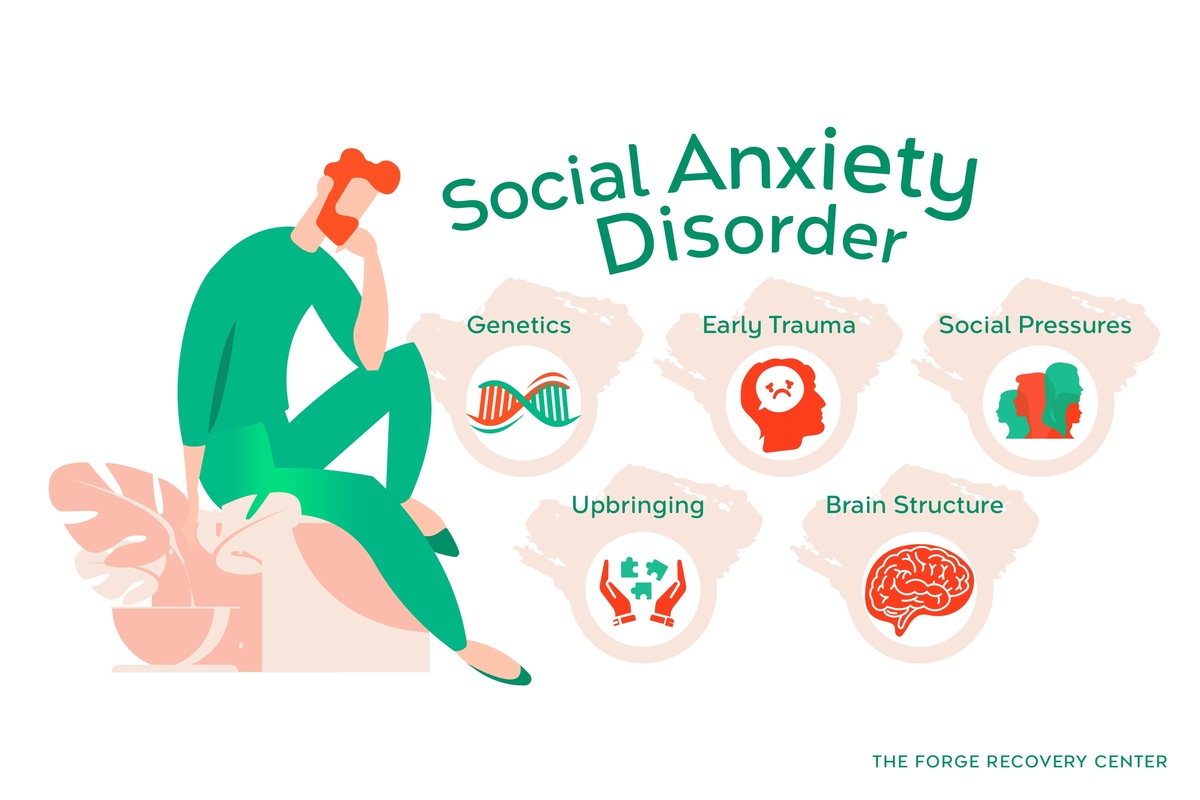Social Anxiety Disorder: Understanding Symptoms & Treatment Options


We understand that social anxiety disorder can feel like a wall you can’t get past, causing fear and avoidance of social interactions. But you’re not alone in this battle, and treatment is available in the form of therapy and medication. Learn about the symptoms and treatment pathways for social anxiety disorder, and call The Forge Recovery Center today to ease those social-based fears and triggers.
What Is Social Anxiety Disorder?
Social anxiety disorder, also known as social phobia, is a mental health condition characterized by an intense fear of social situations. People with social anxiety disorder may feel overwhelming self-consciousness, fear of judgment, and anxiety about being embarrassed or humiliated in social settings. This can significantly impact their ability to engage in everyday activities, interact with others, or attend social events.
Symptoms of social anxiety disorder can range from mild to severe, and may require professional treatment such as therapy or medication to manage effectively.
Symptoms of Social Anxiety Disorder
Social anxiety disorder is primarily marked by feelings of anxiety when in social situations. It also carries a set of physical symptoms, such as sweating and trembling, in triggering scenarios. Let’s explore these symptoms further:
Social Avoidance
When experiencing social anxiety disorder, you may tend to avoid social situations altogether. This avoidance can disrupt your daily routines and strain your relationships with friends, family, or colleagues. Commonly avoided situations include parties, public speaking engagements, or even simple interactions like making phone calls.
In such cases, individuals often isolate themselves, leading to feelings of loneliness and detachment from social circles. This avoidance behavior can significantly impact your quality of life and prevent you from pursuing opportunities for personal growth and development.
Emotional Symptoms
Emotionally, social anxiety disorder manifests in various ways. You may constantly fear negative judgment from others, which can be paralyzing in social settings. The worry about embarrassing yourself in front of others is a prevalent emotional symptom that many individuals with social anxiety experience.
Moreover, the intense fear of interacting with strangers or initiating conversations can cause overwhelming distress and unease. These emotional symptoms can lead to a cycle of self-doubt and low self-esteem, affecting your overall mental well-being.
Behavioral Signs
Behavioral signs of social anxiety disorder are observable through actions such as avoiding eye contact, speaking softly, or fidgeting nervously in social situations. The anxiety you feel before upcoming social events is a common behavioral sign that indicates underlying social fears and worries.
The fear of physical symptoms like blushing, sweating excessively, or trembling in front of others is another key behavioral sign of social anxiety disorder. These behaviors often stem from a deep-seated fear of embarrassment or scrutiny by those around you.
Physical Symptoms
Rapid Heart Rate
A rapid heart rate is a prevalent physical symptom associated with social anxiety disorder. When faced with social interactions or public speaking engagements, your heart may start racing due to heightened levels of anxiety and stress. This physiological response can exacerbate feelings of nervousness and discomfort in social settings.
Sweating
Excessive sweating is another common physical symptom experienced by individuals with social anxiety disorder. Social interactions can trigger profuse sweating due to heightened levels of stress and anxiety. The discomfort caused by sweating excessively can further intensify feelings of embarrassment and self-consciousness.
Trembling
Individuals with social anxiety disorder may experience trembling or shaking in social situations as a physical manifestation of their underlying anxieties. This trembling response often occurs when feeling overwhelmed or exposed in social settings due to the fear of negative evaluation or judgment by others.

Are You Struggling with Mental Health or Addiction?
We Can Help. Call Us Now!
CALL: 877-839-1772
Social Anxiety Disorder Treatment Overview
Social anxiety disorder is typically treated with a combination of therapy, such as CBT and exposure therapy, and anti-anxiety medication. Treatment can be administered by a mental health professional or outpatient treatment center. Here’s a more in-depth overview of treatment options for social anxiety disorder:
Therapy
CBT
Cognitive behavioral therapy (CBT) is a widely used treatment for social anxiety disorder. CBT focuses on changing negative thought patterns and behaviors that contribute to anxiety. This therapy helps you identify and challenge irrational beliefs, gradually reducing anxiety levels.
CBT is effective in managing symptoms of social anxiety disorder by teaching you coping strategies to face feared situations. By learning to reframe negative thoughts and practice exposure techniques, you can build confidence in social interactions.
Exposure Therapy
Exposure therapy is another treatment method for social anxiety disorder that involves gradually exposing yourself to feared social situations. This gradual exposure helps desensitize you to anxiety triggers, reducing avoidance behaviors over time.
Engaging in exposure therapy allows you to confront your fears in a controlled environment, leading to decreased anxiety responses. By facing your anxieties head-on and realizing they are manageable, you can regain control over your social interactions.
Medication
Medication can be an essential part of treating social anxiety disorder by helping manage symptoms like anxiety and panic attacks. Antidepressants, such as selective serotonin reuptake inhibitors (SSRIs) or benzodiazepines, are commonly prescribed to alleviate symptoms.
Different types of medications work in various ways to reduce anxiety levels and improve overall functioning. Your healthcare provider will determine the most suitable medication based on your specific symptoms and medical history.
Mental Health Treatment Centers
Connecting with a mental health treatment center that specializes in social anxiety disorder allows you to receive personalized psychotherapy sessions tailored to your needs. These facilities offer a range of treatments, including CBT and exposure therapy, to help you effectively manage your symptoms.
By seeking treatment at mental health centers, you can access comprehensive care that addresses both the psychological and physical aspects of social anxiety disorder. Through therapy sessions and medication management, you can work towards long-term symptom relief and improved quality of life.
What Causes Social Anxiety Disorder?
Social anxiety disorder can stem from a combination of your genetic predisposition to the condition, as well as certain environmental influences:
Genetic Link
When it comes to social anxiety disorder, it's crucial to understand the genetic link. If a family member has this condition, you have an increased risk of developing it too. This disorder is often influenced by genetic factors interacting with the environment. Genetic predisposition can affect how you handle social settings and relationships.
Environmental Influences
Environmental factors play a significant role in triggering social anxiety disorder. High-pressure social situations or unfamiliar settings can worsen symptoms. Changes in social events can intensify feelings of anxiety and discomfort for individuals with this disorder. Interactions with others can greatly impact the mental health of those with social anxiety disorder. Teenage years pose a higher risk due to the challenges of navigating social scenarios.

Are You Struggling with Mental Health or Addiction?
We Can Help. Call Us Now!
CALL: 877-839-1772
What Is a "Trigger"?
When it comes to social anxiety disorder, triggers play a significant role in how individuals experience and manage their condition. Triggers can manifest in various forms, from social events to work situations, affecting your ability to interact with others effectively. Recognizing these triggers is essential for navigating social anxiety.
Understanding the risk factors and signs of triggers is crucial in preparing yourself to cope with challenging situations. By being aware of what may set off your anxiety, you can develop strategies to mitigate its impact on your daily life. Seeking help and support from professionals can also provide valuable insights into managing triggers effectively.
By developing coping skills tailored to your specific triggers, you can experience positive changes in how you respond to anxiety-inducing situations. Whether it's through therapy, mindfulness techniques, or lifestyle adjustments, taking proactive steps toward addressing your triggers can lead to improved overall well-being.
Social Interactions
Examples of social interactions that could "trigger" social anxiety disorder include meeting new people, attending social gatherings, being the center of attention, speaking up in a group setting, making phone calls, and participating in job interviews. These situations can cause individuals with social anxiety disorder to feel intense fear, self-consciousness, and worry about being judged or humiliated by others, and the anticipation of these interactions can also lead to significant distress and avoidance behaviors.
Performance Events
Recognizing the signs of social anxiety disorder during performance events is crucial for effective management. Developing coping mechanisms specific to work-related performance situations can help alleviate anxiety levels significantly. Improving social interactions and relationships within performance settings can create a more supportive environment conducive to growth. Seeking professional help and exploring treatment options are vital steps towards addressing social anxiety disorder effectively.

Effects of Social Anxiety Disorder
If left unmanaged and untreated, social anxiety disorder can disrupt several aspects of life, from your day-to-day activities to your closest relationships and work performance:
Daily Life
Social anxiety disorder can significantly impact your daily life. You may find it challenging to engage in social activities, leading to feelings of isolation and loneliness. Simple tasks like going to the grocery store or attending a social gathering can become overwhelming for you.
Moreover, you might experience physical symptoms such as sweating, trembling, or a racing heart when faced with social situations. These symptoms can further exacerbate your anxiety and make it difficult for you to function normally in day-to-day activities.
Relationships
Social anxiety disorder can strain your relationships with friends, family, and romantic partners. You may avoid social interactions altogether, causing misunderstandings and distance between you and your loved ones. This avoidance behavior can lead to feelings of guilt and further isolate you from much-needed support systems.
The fear of judgment or embarrassment in social situations can prevent you from forming new relationships or deepening existing ones. This lack of connection can contribute to feelings of loneliness and negatively impact your mental well-being.
Career
In the workplace, social anxiety disorder can impede your career growth and performance. You may struggle with public speaking, networking, or participating in meetings due to intense fear and self-consciousness. This can hinder your ability to showcase your skills and expertise, potentially limiting opportunities for advancement.
Moreover, the constant worry about making mistakes or being judged by colleagues can create a hostile work environment for you, leading to increased stress and decreased job satisfaction. These factors combined can ultimately affect your overall job performance and professional development.
Are You Struggling with Mental Health or Addiction?
We Can Help. Call Us Now!
CALL: 877-839-1772
Social Anxiety Disorder Prevalence
Social anxiety disorder is shockingly prevalent both globally and in the United States. Here are some of the most recent stats regarding social anxiety disorder prevalence domestically and abroad:
Worldwide
Social anxiety disorder affects people globally, with an estimated 36% of the world's population (one in three) experiencing this condition at some point in their lives. Recent statistics show that it is one of the most common mental health disorders worldwide, making up about 18% of total psychiatric disorder cases. In various countries, the prevalence rates may vary, but overall, it remains a significant concern for public health.
In some regions, such as Western countries, the prevalence of social anxiety disorder tends to be higher compared to other parts of the world. This could be attributed to cultural factors, societal pressures, and access to mental health resources. Despite these variations, social anxiety disorder impacts individuals from diverse backgrounds and age groups across different continents.
In the United States
In the United States alone, social anxiety disorder affects approximately 15 million adults. This makes it one of the most prevalent mental health conditions in the country. Recent studies indicate that around 7% of Americans experience symptoms of social anxiety disorder each year.
For many individuals in the United States, social anxiety can significantly interfere with daily activities, relationships, and work performance. The impact of this disorder on both personal and professional aspects of life underscores the importance of early detection and effective treatment options. Seeking support from mental health professionals and engaging in therapy can help manage symptoms and improve overall well-being.
Closing Thoughts
Understanding social anxiety disorder is crucial in recognizing its symptoms, seeking appropriate treatment, and comprehending its impact on individuals. By acknowledging triggers and effects, you can navigate this condition more effectively. Remember, you are not alone in facing social anxiety disorder; support, therapy, and self-care strategies are available to help you manage and overcome its challenges. Stay informed, seek professional guidance, and prioritize your mental well-being.
Are You Struggling with Mental Health or Addiction?
We Can Help. Call Us Now!
CALL: 877-839-1772
Social Anxiety Disorder Treatment in Orange County
Living with social anxiety disorder can feel like navigating a maze in the dark. The constant fear of judgment in social situations, the physical symptoms that accompany anxiety, and the avoidance of social interactions are daunting — but treatment is available to ease your struggles. At The Forge Recovery Center, we recognize the courage it takes to seek help, and we’re here to support you on your journey.
Our team of mental health professionals is equipped with proven treatment modalities to guide you towards mental wellness. If you or a loved one are grappling with social anxiety disorder and need professional support, don’t hesitate to reach out to The Forge Recovery Center. Your path to healing starts with seeking help.
Treatment Modalities We Offer
The Forge Recovery Center utilizes evidence-based therapies to treat a wide range of conditions, including:
Case Management
Our experts steer clients towards resources that support recovery, evaluating personal risks to devise a thorough treatment plan.
CBT
CBT aids clients in altering negative thought cycles and behaviors associated with drug addiction, with the goal of preventing relapse and promoting a drug-free lifestyle.
DBT
DBT aids those grappling with emotional instability from substance abuse, promoting emotional control and positive life alterations.
EMDR
EMDR enables clients to process trauma that may contribute to their addiction, utilizing eye movement techniques to lessen psychological distress.
Experiential
Participants rekindle life’s pleasures and confront the root trauma of addictive behaviors through engaging in therapeutic activities.
Family Counseling
Family therapy strengthens family bonds and nurtures a supportive network vital for sustained recovery and abstinence.
Group Therapy
Group therapy offers a communal space for support, enhancing recovery through the exchange of stories and collective resilience.
Individual Therapy
Customized sessions focus on the distinct challenges each client faces, assisting their journey toward a life free from substances.
MAT
MAT merges approved medications with counseling to effectively fight addiction, alleviating withdrawal symptoms and minimizing the likelihood of relapse.
TMS
TMS, a non-invasive technique, employs magnetic fields to stimulate the brain, aiding in the reduction of intense drug cravings.
Motivational Interviewing
This strategy motivates clients to make healthier decisions, such as overcoming cocaine addiction, by nurturing a sense of self-belief.
Trauma-Informed Care
Acknowledging trauma’s influence on addiction, trauma-informed care can be effective in guiding clients through treatment and comprehending its impact on their mental and emotional well-being.



